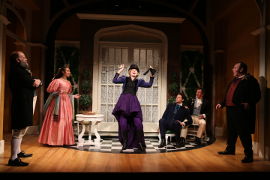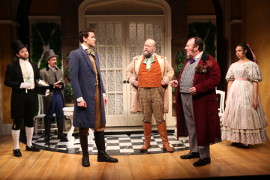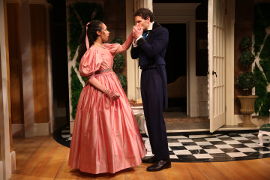“London
Assurance” is a sure cure for the January blues
 |
| Rachel Pickup and Colin McPhillamy. Photo by
Carol Rosegg. |
“London
Assurance” by Dion Boucicault, directed by Charlotte Moore
Irish Repertory Theatre, 132 W. 22 St. NYC
Dec. 6, 2019 until Feb. 9, 2020.
Wednesdays at 3pm and 8pm, Thursdays at 7pm, Fridays at 8pm, Saturdays
at 3pm and 8pm, Sundays at 3pm
Tickets $ 45-70 ovationtix.com or 212-727-2737.
Reviewed
by Glenda Frank
Charlotte Moore’s production of “London Assurance”
by Dion Boucicault at the Irish Repertory Theatre is scrumptious.
Totally delicious! This is especially surprising for a British comedy
of manners from 1841, one penned by 20 year old novice. Strong women
and clever phrasing are script stand-outs. The production has a
varied, lively, with just enough exaggeration and gesture, and without
that frenetic quality some directors confuse with the comic tone.
Moore has allowed the talent to have fun with the script. There
is just such pleasure in each twist and turn that you wonder how
the actors can bear to leave this satirical world of absurd love
matches, willful beautifies, a barely disguised young lover, and
general mayhem. The performances are far from wink-wink but there
is mad look in the actors’ eyes during particularly juicy
bits that say, I am so happy to find myself in this role.
 |
| Brian Keane and Colin McPhillamy. Photo by
Carol Rosegg. |
The play seems to be about the ne’er-do-well Charles (Ian
Holcomb) and his sixty-something father, Harcourt Courtly (Colin
McPhillamy), who believes his rouged cheeks and dyed hair have turned
back time and transformed him into lady candy. While his son has
been amassing debts, he has found himself an 18 year old bride with
a handsome dowry and good real estate. His friend (Brian Keane as
the raisonneur), questioning why she would want to marry him, dubs
him “a living libel upon common sense.” Harcourt finds
the question ridiculous. Charles’ valet, Cool, brags to us,
in one of several direct addresses, that he is the best liar in
London. Scallywags all! We are soon transported to the Lady Grace
Harkaway’s country estate, where she explains that she is
resigned to the marriage, since she must marry and has no interest
in love.
Enter a bespeckled Charles (in disguise) to check out his new mother.
He is quickly bewitched by Grace and bewildered by his plight. And
then the lovely Lady Gay (Rachel Pickup) arrives at the Harkaway
estate – in a burst of energetic good will and athletic health.
She has just ridden over and you can bet it was more a gallop than
a trot. When her mild-mannered husband (Robert Zukerman) arrives,
you wonder at the match, but she protests deep affection. Why? Because
he allows her freedom few other men would. “He never permits
me to spend more than I like,” she confesses. She is her own,
very modern woman with eyes for no one else. So when Lord Harcourt
Courtly, who is indifferent to his new fiancée, pronounces
his deepest devotion, she can be canny and rather than reject him,
seems to play along with his proposed romantic flight.
She and Charles plot to secure Grace’s freedom to marry the
younger Courtly, the eavesdropping villain is more an after-thought
than a threat, and all ends as we like it. But meanwhile we can’t
get enough of Boucicault’s addiction to the well-turned phrase
and Colin McPhillamy’s Harcourt, whose refusal to grow old
graceful becomes almost a heroic denial. Like Rachel Pickup’s
Lady Gay, his joie de vivre seems boundless. Wonderfully inventive
period costumes by Sara Jean Tosetti; set by James Noone.
“London Assurance” is a sure cure for the January blues
– or even those moments in any month when a clever comedy
is the right tonic.
Money,
Matrimony & Madness in
"London Assurance"
“London Assurance” by Dion Boucicault
Opened December 15, 2019
Irish Repertory Theatre, 132 West 22nd Street.
Closes on Sunday, February 9, 2020.
Running 2 hours and 20 minutes with one 15-minute intermission.
Ovationtix.com, irishrep.org, or call 866-811-4111.
Reviewed by Edward Rubin
 |
Photo by Carol Rosegg |
First things first. Before I delve into the Irish
Repertory Theater’s marvelous production of London Assurance by
Dublin-born playwright Dion Boucicault (1820-1890) – extended
now through Sunday, February 9 – I must say that the award-winning
Irish Rep is a gift from heaven.
Their choices of what to produce coupled with the
actors they choose to cast is simply and consistently wonderful.
And this wonderfulness goes for their use of top-of-the-line, set,
costume, lighting, sound, and hair and wig designers for each play.
Each and every production is a joyous event. I have never left either
of their two intimate theaters without having been put in touch
with my own humanity, be it tears or laughter or both.
Or for that matter being enlarged as a human being.
No doubt this touching of one’s heartstrings
is an Irish thing, a deeply ingrained trait, if you will. For those
questioning such gushing: No! this is not a paid advertisement.
It is a fact!
 |
Photo by Carol Rosegg |
First produced in Convent Garden in 1841, when Boucicault
was 21, London Assurance, is a farcical comedy of manners,
here directed by Charlotte Moore with a healthy dollop of laissez-faire,
is the cleverest and most enjoyable play to open this season.
It is a precursor to the plays of Oscar Wilde (1854-1900),
with more linguistic wordplay than chickens in a coop. His speechifying
characters not only tell each other (and the audience too) everything
that they are thinking but everything that they would like to persuade
themselves that they have thought. Often a familiar phrase is used
where dignified language would be expected; sometimes the reverse.
Boucicault’s style as an introduction of words
to each other, which have never made acquaintance and which think
that they will not get on together. It is ingeniously ear-opening.
Though the playwright’s embroidery of language, hand tailored
with much thought and observation on culture and class fits each
character like a glove, it is in each actor’s letter-perfect
delivery where the fireworks reside.
It is no accident that shards of Oscar Wilde’s
(1854-1900) clever wit, sharp satire, striking use of language and
keen observation – obviously characteristics shared with Boucicault
– permeates London Assurance. Though 34 years younger
than Boucicault, it seems the older playwright was friendly with
Oscar’s parents. Wilde was not only aware of Boucicault’s
plays but had the temerity to send him a copy of Vera; or,
The Nihilists (1880), his own very first play.
“You have dramatic powers but have not shaped
your subject perfectly before beginning it,” Boucicault responded.
He suggested that “a chain of incidents,” not mere
dialogue, should “lead from one to the other” of the
main events of the play. A couple of years later, in a letter to
a mutual friend he writes that Oscar “…might make a
fair income – if better managed – reduce his hair and
take his legs out of the last century.”
Like his characters in London Assurance, Boucicault’s
life, both as an actor, theater producer and a playwright was a
wild ride. He had a great many twists and turns, bankruptcies, a
scandal or two, and three marriages. Anne Guiot, his first wife,
much older than Boucicault, died in a Swiss mountaineering accident
in 1845, the first year of their marriage. In 1853 he eloped in
New York City with 20-year old actress Agnes Kelley Robertson, where
they eventually became naturalized American citizens in 1873. Boucicault
suddenly left Agnes and their six children for 21-year old Josephine
Louise Thorndyke, whom he married in Sydney, Australia in 1885.
A global scandal ensued, as his marriage to Agnes was still valid.
It was eventually dissolved by reason of “bigamy with adultery”
in 1888.
Along the way the ever-prolific Boucicault managed
to write over 125 plays, many of which he acted in both to great
acclaim on Broadway, cities across the country, as well as in Australia
and London. In the USA, as Irish Rep’s program informs us,
Boucicault was instrumental in passing the first copyright law for
drama in 1853, and he staged the first-ever matinee performance
a year later.
This same period introduced several of Boucicault’s
most beloved plays, including The Poor of New York, The
Octoroon (the first play to treat seriously the black American
population), and The Coleen Bawn, along with major technical
innovations in stagecraft, including trap doors and fireproof scenery.
His last play, A Tale of a Coat ran for a month in 1890
at Daly’s Theatre on Broadway the same year that Boucicault
died. His final resting place is Mount Hope Cemetery at Hastings-On-Hudson,
Westchester County, New York.
The premise of the play revolves around the 60-something
Sir Harcourt Courtly’s (Colin McPhillamy) impending engagement
to 18-year old Grace Harkaway (Caroline Strang), a young girl some
40-plus years his junior. It seems that her dead father’s
will stipulated, inexplicably, that if she refuses to marry Harcourt,
the estate goes to Harcourt’s son Charles (Ian Holcomb). If
Grace does marry him, something she has already resigned herself
to, her formidable dowry, as well as her life, becomes the property
of Harcourt. In short, as both parties frequently comment on, it
is an arranged marriage based on economics.
As Harcourt tells it, he has seen her “bankers
account” and looks forward to the 15,000 pounds annually that
this marriage will give him. As for the ever rationalizing and pragmatic
Grace, adding a whiff of hope to her situation, states that the
“gentleman swears eternal devotion to the lady’s fortune,
and the lady swears she will outlive him still.”
Sir Harcourt’s character is brilliantly played
to a fare thee well by Colin McPhillamy with delicious eye-popping
double-takes, physical and facial contortions and abrupt changes
of mind. While his portrayal elicits the most laughter, every character,
has their own hilarious star turn.
The play begins at the London home of Harcourt with
light banter between Harcourt’s tipsy son and a newly found
friend Dazzle (Craig Wesley Divino), who brings him home from a
night on the town. Small talk about marriage takes place between
them and Harcourt’s friend, Grace’s Uncle Max Harkaway
(Brian Keane). Also, on stage is the annoying presence of Mark Meddle
(Evan Zes), a slimy and devious, non-stop talking lawyer, eager
to make a fast buck by selling information he claims to know. With
conversation at a lull, everybody leaves for Harkaway’s country
estate to get the engagement underway.
 |
Photo by Carol Rosegg |
It is here at Oak Hall, amidst and amazingly detailed
set (James Noone) and fabulous period costumes (Sara Jean Tosetti)
which gently brings us back in time, that we first meet the lovely
Grace, Harcourt’s intended, and the lusty, uber-wonderful
breath of fresh air, Lady Gay Spanker (Rachel Pickup), who actually
carries a whip. Her equally wonderful, and all accepting –
and possibly gay – husband Adolphus Spanker (Robert Zukerman)
follows her around like a puppy. In no time at all, with a good
deal of double-dealing intrigue, spying on each other, clever repartee
and audience-delivered asides, all hell breaks loose.
Harcourt falls in with Lady Gay. Grace and Harcourt
Jr fall in love, and the shifty-eyed Meddle, eager to fill his pockets
any way he can, attempts to blackmail just everybody in sight. All
I can say is watching the unraveling and reweaving of everybody’s
life, is a satisfying hoot, one that had the audience, myself included,
leaving the theater with a big smile on our faces.
|

